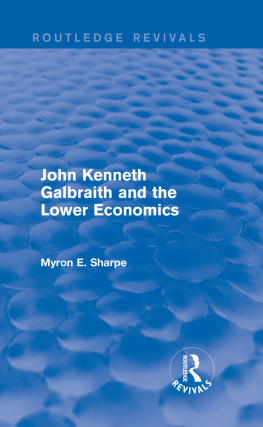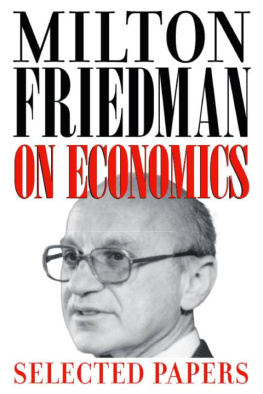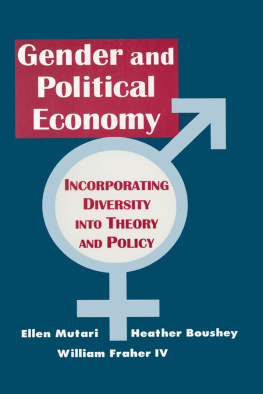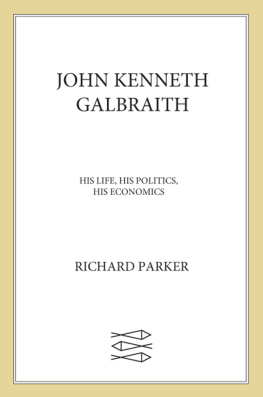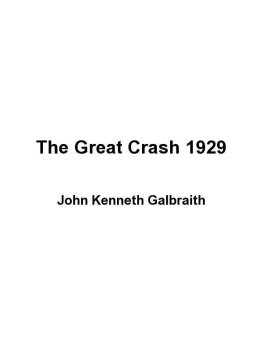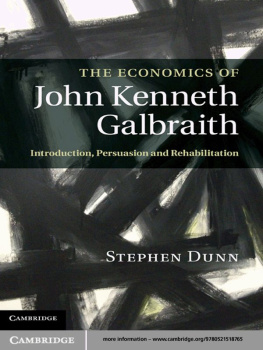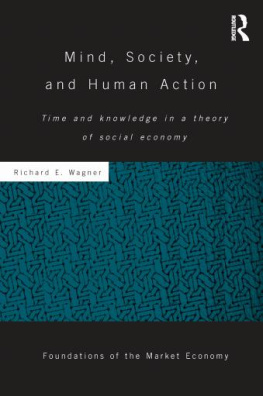John Kenneth Galbraith and the Lower Economics
John Kenneth Galbraith and the Lower Economics
Myron E. Sharpe
First published 1973 by International Arts and Science Press, Inc.
Reissued 2018 by Routledge
2 Park Square, Milton Park, Abingdon, Oxon OX14 4RN
711 Third Avenue, New York, NY 10017, USA
Routledge is an imprint of the Taylor & Francis Group, an informa business
Copyright 1973 by Taylor & Francis
No part of this book may be reprinted or reproduced or utilised in any form or by any electronic, mechanical, or other means, now known or hereafter invented, including photocopying and recording, or in any information storage or retrieval system, without permission in writing from the publishers.
Notices
No responsibility is assumed by the publisher for any injury and/or damage to persons or property as a matter of products liability, negligence or otherwise, or from any use of operation of any methods, products, instructions or ideas contained in the material herein.
Practitioners and researchers must always rely on their own experience and knowledge in evaluating and using any information, methods, compounds, or experiments described herein. In using such information or methods they should be mindful of their own safety and the safety of others, including parties for whom they have a professional responsibility.
Product or corporate names may be trademarks or registered trademarks, and are used only for identification and explanation without intent to infringe.
Publisher's Note
The publisher has gone to great lengths to ensure the quality of this reprint but points out that some imperfections in the original copies may be apparent.
Disclaimer
The publisher has made every effort to trace copyright holders and welcomes correspondence from those they have been unable to contact.
A Library of Congress record exists under LC control number: 73075074
ISBN 13: 978-1-138-04518-7 (hbk)
ISBN 13: 978-1-315-17208-8 (ebk)
In honor of my mother;
in memory of my father
In Ambassador's Journal, John Kenneth Galbraith acknowledged that he was "without rival as the nation's first expert on the price of hogs." The present book will not deal with hog prices. Price theory belongs to the higher learning, and this essay does not venture into that realm. But the very mention of hog prices does bring to mind the fact that Galbraith is a man of many callings. The Journal was written while he was Ambassador to India under John F. Kennedyor was it under Dean Rusk? Since then he has been Chairman of the ADA, President of the American Economic Association, advisor to would-be presidents and general public irritant. During World War II Galbraith was chief price-fixer in the OPA and from that experience came his most scholarly book, A Theory of Price Control. In Galbraith's opinion it is his best book. I am inclined to agree. It is also his most unread book and comes in a plain brown wrapper instead of a colorful dust jacket. The resulting trauma led Galbraith to resolve never to write a book for economists again. He has never deviated from that resolution.
The essay in your hands has nothing to do with any of these things. Rather it is about only one aspect of Galbraith's activities and thought, but that aspect happens to be the most important: his writings in political economics. The high theme of these writings is that we live in an economy of concentrated economic power. Textbook theory fails to explain this economy; it deals with bygone days. Galbraith's job is to push, drag, cajole and finesse economics into the latter half of the twentieth century. An important part of that job is to convince the public that the commonly accepted goals of economic growth and full employmentvariously defined by Republicans and Democratsare obsolete. The purpose of the economy should not be simply to produce more of anything that happens to get produced. "The question now is what we produce and for whom and on what terms." That chord was first sounded in The Affluent Society, an ironic title which describes a society that has the wealth to solve its problems if only it has the will.
Power and politics have been removed from economics and must be put back if economics is to regain its connection with reality. The most cherished tenet in the history of economic thought is that of the marvelous self-regulatory free market. Admit that the market is self-regulating, and the issue of power disappears from economics. Deny it, and power reappears. The steady preoccupation of the mature Galbraith is to deny it; to assert that the modern economy is incapable of self-regulation; and to deny that it can be made capable of it.
The antitrust faction has spent a century arguing the opposite case. Bust the trusts. Power will be removed from the marketplace and self-regulating free competition will be restored. Impossible, says Galbraith. Bigness is a fait accompli. You can nibble here and nibble there with antitrust suits, but unless you are willing to dismantle two-thirds of the economy, you can't go back to the textbook market. The antitrusters have, like Don Quixote battling the windmill, tried with might and main to do it. But really to do it means all-out war against big business. The revolutionary implications are just too staggering for a man of Galbraith's moderate disposition to contemplate.
The alternative to antitrust is to accept bigness and to regulate it. That requires not just a regulatory device but a political movement that can win over public opinion. Winning over public opinion is the first step in emancipating the state from corporate power. The reader will find the clearest statement of Galbraith's program in Who Needs the Democrats and of his principles in the 1972 Presidential Address to the American Economic Association. No doubt the Democrats will try many of the things to be found in these documents when they get the chance.
Galbraith's views have manifestly evolved over the years. The ideas which were frozen into print in 1952 or 1958 are not all necessarily the ideas of the present Galbraith. Criticism of them is therefore not necessarily criticism of the present Galbraith. But if the reader approaches Galbraith (and this essay) with Galbraith's underlying assumptions firmly in mind, then various details of analysis with which the readeras well as Galbraith may or may not agree, will appear secondary, and the larger picture will emerge.
Only one question remains, and that is, why I wrote this book. A preface is the place for confessions, and so it is not wrong to admit that I wrote this book because I admire Galbraith. To identify important problems requires a special gift; Galbraith has it. But admiration does not require agreement, and since one confession leads to another, I must further admit that the book turned out to be far more critical than I had anticipated. To start with approbation and end with faultfinding is, I suppose, one of the hazards of writing anything longer than a one-page letter. While it would not be quite accurate to say that I agree with Galbraith about everything in general and nothing in particular, some such formula will have to do until I can think of a better one. The result of this posture is a friendly polemical discussion of some disputed questions of political economy.
MES
White Plains, New York
February 1973
A Note on Sources and Page References

